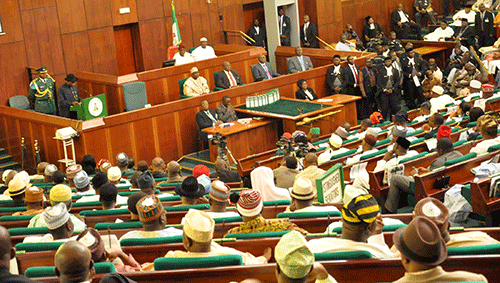Editor, Politics/Features, EMEKA ALAEX DURU, examines the on-going leadership controversy in the National Assembly and its likely impact on the Buhari administration.
To enlightened commentators, current developments in the National Assembly are hardly surprising. It is only the timing and the characters at play that may have made some differences, if any.
In fact, while the All Progressives Congress (APC) coasted home to victory in the March 28 national and April 11 state elections, perceptive analysts had celebrated the feat with a great deal of caution. Ordinarily, the party’s outing at the polls had called for rolling out of drums in excitement.
For APC, which had come on board barely a year ago, to rout the Peoples Democratic Party (PDP) that had been in the saddle since the onset of the present democratic dispensation in 1999, there was much to flaunt. It was also the first time in the nation’s history that a party in opposition was taking power from a ruling party, an incumbent for that matter.
On account of these considerable historical landmarks, APC leaders had reasons to prance about. And they actually did, even beating their chests for the rare attainment.
But even as they enthused on their courageous outing, concerned analysts had nursed a hunch on the post-election management of the party’s electoral fortunes. The major concern was that some of the elements that constituted the nucleus of the party do not have credible antecedents of election victory management.
This, particularly, appeared the greatest undoing of the Alliance for Democracy (AD) that, over time, evolved to Action Congress (AC), later Action Congress of Nigeria (ACN) that played major role in the evolution of APC.
Back in the nascent stage of the current era, AD had virtually ran over the politics of the largely Yoruba South West on the mantra of progressive ideology, which critics had actually doubted. Rather than proving its mettle, the leadership of the party got alienated from the electorate, with the result that by 2003, the party had lost out to the rampaging PDP, retaining only Lagos out of six states that were originally in its column. Imposition of candidates and absence of internal democracy were identified as the factors that primarily worked against the party.
But by 2011, the party had, through transformation, metamorphosed into ACN that served as the vehicle for it to regain some lost grounds. The renewed fervor and accompanying goodwill also provided the artery for the formation of APC. Cashing in on the rulership deficit of the PDP, APC easily chanted ‘change’ as its slogan. That readily fell into the expectations of Nigerians. Yet there were fears of its leadership being carried away by the allure of victory.
The ugly developments in both houses of the National Assembly, last Tuesday, gave vent to those apprehensions. Before the Tuesday inauguration of the NASS members, APC, in a manner that was not elaborately explained to even some key members, had advertised an Ahmed Lawan/George Akume leadership for the Senate as well as Femi Gbajabiamila/Ali Monguno for the House of Representatives.
The decision, however, did not go down well with the Bukola Saraki group in the Senate nor the Yakubu Dogara elements in the House. The aggrieved elements, who clearly had been schemed out of APC consideration, went into alliance with their PDP colleagues, thus giving rise to a Saraki/Ike Ekweremadu victory in the Senate and Dogara/Yusuf Lasun emergence in the House.
APC kicks
APC has understandably not taken the matter lightly. Raising the banner of threats and protest, the party has vowed to get even with the Saraki and Dogara groups. Obviously dazed by the outcome of the Tuesday exercise, the party had in a statement by its National Publicity Secretary, Lai Mohammed, described as totally unacceptable and the highest level of indiscipline and treachery the NASS inauguration that led to the emergence of Saraki as Senate president and Dogara as House of Representatives Speaker.
“There can be no higher level of treachery, disloyalty and insincerity within any party,” he fumed, adding that the party would use all constitutional and legal means available to it to reverse the exercise. Mohammed vowed that APC would not accord the current NASS leadership any recognition, adding, curiously, that with the developments in the legislature, the change promised to Nigerians by the party would no longer be attainable.
Danger ahead
Not a few Nigerians have taken the disturbing trends in APC lightly. Though President Muhammadu Buhari had, before the NASS inauguration, pledged not to interfere with the activities of the lawmakers, but to work with any leadership selected by them, there has been immense concern that the issues in the legislature, unless properly resolved, may work against his administration’s agenda for the country.
This fear particularly gains ground on a count of the unyielding position of the key figures in the NASS drama. APC, for example, intends to have its way in having its preferred candidates occupy the exalted seats. There are also no indications of the Saraki and Dogara groups climbing down from their positions.
Somehow, the power configuration in the party, if anything, may not provide basis for them to give in. APC, at formation, emerged from the fusion of ACN, All Nigeria Peoples Party (ANPP), Congress for Progressive Change (CPC) and fragments of All Progressives Grand Alliance (APGA), not forgetting the game-changing new PDP. ACN came on board with four South West states of Lagos, Ogun, Osun and Oyo, in addition to Edo from the South South. ANPP brought in Borno, Yobe and Zamfara. CPC came in with Nasarawa, its only state. APGA had Imo State, while new PDP elements came to the table with Sokoto, Adamawa, Rivers, Kwara and Kano states.
In sharing the offices, however, CPC produced Buhari, the President; ACN had Yemi Osinbajo occupying the Vice Presidential slot. ANPP had John Oyegun-Odigie, the National chairman, representing its interest. Original APGA and PDP elements in the party appeared to have been totally ignored. With the developments in NASS on Tuesday, the PDP wing, seems to have been compensated.
This is the sentiment, supporters of Saraki and Dogara are throwing up in insisting that they should not give in to APC threats. Both, incidentally, were of the PDP before joining the party last year. The fear, thus, is that the legislative leadership crisis in the party may linger.
Henry Chidi Nwuke, a Lagos lawyer, in fact, captured the breezy development in his facebook posting. He said: “What happened in the NASS (on Tuesday) with the election of principal officers should not surprise anyone. It only confirms that APC is still what it is, a party-in-formation. To some people, it is just a special purpose vehicle to attain a life ambition. To others, it is a platform used to avenge some perceived injustice in PDP, and for others, just a means of accessing the national vaults.
“But to an average Nigerian, it provided an opportunity to show anger against the party that represents the perfidy that has become the norm in Nigeria – PDP. So APC represents a congregation of interests that are not wholly integrated.
“What we saw today is a wing of APC appropriating its booty after the victory at the poll. But this is surely not the end; it’s rather the beginning of interesting times ahead. These divergent interests will certainly fight it out for total control in future. At the end of it all, APC may emerge as a party truly so called, or implode. Tomorrow is pregnant.”
Not even the most ardent supporters of the party have faulted this analysis. Many rather fear the resurgence of the so-called banana peels that had seen a high turn-over of NASS leadership in the former President Olusegun Obasanjo days.
The fear in this regard is that if the NASS members are not allowed to select their leaders on their own, there may be the tendency of leadership crisis that may see them not working in one accord. That was the situation when Obasanjo was instrumental in the rise and fall of successive leadership of NASS.
Victims of the whimsical power game included Senators Evan Enwerem, Chuba Okadigbo and Adolphus Wabara. Salisu Buhari suffered the same fate in the House of Representatives, aside allegations of perjury and certificate forgery against him.














